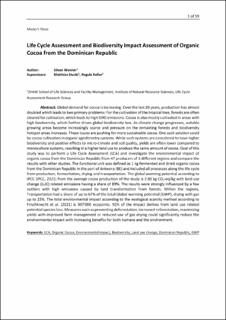Please use this identifier to cite or link to this item:
https://doi.org/10.21256/zhaw-28981Full metadata record
| DC Field | Value | Language |
|---|---|---|
| dc.contributor.advisor | Stucki, Matthias | - |
| dc.contributor.advisor | Keller, Regula | - |
| dc.contributor.author | Wanner, Silvan | - |
| dc.date.accessioned | 2023-10-27T13:26:55Z | - |
| dc.date.available | 2023-10-27T13:26:55Z | - |
| dc.date.issued | 2023 | - |
| dc.identifier.uri | https://digitalcollection.zhaw.ch/handle/11475/28981 | - |
| dc.description.abstract | Global demand for cocoa is increasing. Over the last 20 years, production has almost doubled which leads to two primary problems: For the cultivation of the tropical tree, forests are often cleared for cultivation, which leads to high GHG emissions. Cocoa is also mostly cultivated in areas with high biodiversity, which further drives global biodiversity loss. As climate change progresses, suitable growing areas become increasingly scarce and pressure on the remaining forests and biodiversity hotspot areas increases. These issues are pushing for more sustainable cocoa. One such solution could be cocoa cultivation in organic agroforestry systems. While such systems are considered to have higher biodiversity and positive effects to micro-climate and soil quality, yields are often lower compared to monoculture systems, resulting in a higher land use to produce the same amount of cocoa. Goal of this study was to perform a Life Cycle Assessment (LCA) and investigate the environmental impact of organic cocoa from the Dominican Republic from 47 producers of 3 different regions and compare the results with other studies. The functional unit was defined as 1 kg fermented and dried organic cocoa from the Dominican Republic in the port of Antwerp (BE) and included all processes along the life cycle from production, fermentation, drying and transportation. The global warming potential according to IPCC (IPCC, 2021) from the average cocoa production of the study is 2.80 kg CO2-eq/kg with land use change (LUC) related emissions having a share of 89%. The results were strongly influenced by a few outliers with high emissions caused by land transformation from forests. Within the regions, Transportation had a share of up to 67% of the total Global warming potential (GWP), drying with gas up to 23%. The total environmental impact according to the ecological scarcity method according to Frischknecht et al. (2021) is 307’000 ecopoints. 92% of the impact derives from land use related potential species loss. Measures such as preventing deforestation, increased reforestation, maximizing yields with improved farm management or reduced use of gas drying could significantly reduce the environmental impact with increasing benefits for both humans and the environment. | de_CH |
| dc.format.extent | 59 | de_CH |
| dc.language.iso | en | de_CH |
| dc.publisher | ZHAW Zürcher Hochschule für Angewandte Wissenschaften | de_CH |
| dc.rights | http://creativecommons.org/licenses/by/4.0/ | de_CH |
| dc.subject | LCA | de_CH |
| dc.subject | Organic cocoa | de_CH |
| dc.subject | Environmental impact | de_CH |
| dc.subject | Biodiversity | de_CH |
| dc.subject | Land use change | de_CH |
| dc.subject | Dominican Republic | de_CH |
| dc.subject | GWP | de_CH |
| dc.subject.ddc | 333.7: Landflächen, Naturerholungsgebiete | de_CH |
| dc.subject.ddc | 630: Landwirtschaft | de_CH |
| dc.title | Life cycle assessment and biodiversity impact assessment of organic cocoa from the Dominican Republic | de_CH |
| dc.type | Thesis: Master | de_CH |
| dcterms.type | Text | de_CH |
| zhaw.departement | Life Sciences und Facility Management | de_CH |
| zhaw.publisher.place | Winterthur | de_CH |
| dc.identifier.doi | 10.21256/zhaw-28981 | - |
| zhaw.originated.zhaw | Yes | de_CH |
| Appears in collections: | Masterarbeiten Umwelt und Natürliche Ressourcen | |
Files in This Item:
| File | Description | Size | Format | |
|---|---|---|---|---|
| 2023_Wanner_Silvan_MA_ENR20.pdf | 1.15 MB | Adobe PDF |  View/Open |
Show simple item record
Wanner, S. (2023). Life cycle assessment and biodiversity impact assessment of organic cocoa from the Dominican Republic [Master’s thesis, ZHAW Zürcher Hochschule für Angewandte Wissenschaften]. https://doi.org/10.21256/zhaw-28981
Wanner, S. (2023) Life cycle assessment and biodiversity impact assessment of organic cocoa from the Dominican Republic. Master’s thesis. ZHAW Zürcher Hochschule für Angewandte Wissenschaften. Available at: https://doi.org/10.21256/zhaw-28981.
S. Wanner, “Life cycle assessment and biodiversity impact assessment of organic cocoa from the Dominican Republic,” Master’s thesis, ZHAW Zürcher Hochschule für Angewandte Wissenschaften, Winterthur, 2023. doi: 10.21256/zhaw-28981.
WANNER, Silvan, 2023. Life cycle assessment and biodiversity impact assessment of organic cocoa from the Dominican Republic. Master’s thesis. Winterthur: ZHAW Zürcher Hochschule für Angewandte Wissenschaften
Wanner, Silvan. 2023. “Life Cycle Assessment and Biodiversity Impact Assessment of Organic Cocoa from the Dominican Republic.” Master’s thesis, Winterthur: ZHAW Zürcher Hochschule für Angewandte Wissenschaften. https://doi.org/10.21256/zhaw-28981.
Wanner, Silvan. Life Cycle Assessment and Biodiversity Impact Assessment of Organic Cocoa from the Dominican Republic. ZHAW Zürcher Hochschule für Angewandte Wissenschaften, 2023, https://doi.org/10.21256/zhaw-28981.
Items in DSpace are protected by copyright, with all rights reserved, unless otherwise indicated.